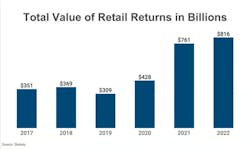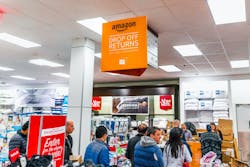How can fleets help
In the retail industry, "there's a big disconnect between what the consumer wants, what the business is able to do or not able to do, and then what the industry—so those fleets—what are they able to do or not in the reverse of getting that large item that is now fully out of the box," Heather Hoover-Salomon, CEO of uShip, told FleetOwner.
Hoover-Salomon believes fleets have a "big opportunity" to help fill this gap and cover some of the freight in the reverse logistics space.
Hoover-Salomon's company uShip is an online marketplace that connects businesses or individuals to large and small shippers to handle goods—from pallets of freight to oversized, bulky items such as antique furnishings.
"You can really think about our platform as an aggregator of unique capacity," Hoover-Salomon said. "So, these are the mom-and-pops of the U.S. that have small to medium fleets. And then also the owner-operator group as well."
UShip serves businesses—such as 1stDibs, Chairish, and car shippers—that want an item returned quickly if a customer is displeased with it. Because these customers ship high-quality and often small-batch items, they also need them back in perfect condition. This is where carriers can step in and provide that service through the uShip marketplace.
Being involved in the freight hauling industry, neither Hoover-Salomon nor Russell Zuppo, VP of consulting at Uber Freight, see freight as reverse or forward—they simply see freight as freight. This is because, for Hoover-Salomon's company in particular, carriers typically handle both. Carriers on uShip often have to package or blanket wrap the goods they transport, so whether the good is in the reverse or forward logistics stage doesn't matter to them.
"You might have these carriers moving a couch, a chest of drawers…fine art—all of these things, and none of them are appropriately packaged where they could go through like a FedEx or UPS," Hoover-Salomon told FleetOwner. "It's very important (to shippers) that they keep those damage rates low. So they don't palletize it and try to send it through an LTL network."
Carriers can sign up to be part of the uShip platform, indicating the type of services and capacities they can provide, such as packaging, box trucks, cargo vans, and more. Shippers can search for a carrier based on their needs, and then the uShip platform connects the two, allowing the shipper to curate a highly specialized carrier network that suits their needs. Consumers can also tap into this network to ship items between friends and family.
See also: Small fleets, owner-operators struggle living off current spot market
Fleets interested in picking up reverse logistics loads another way can have a conversation with their customers.
“Follow where the freight is—and those are your customers,” Zuppo said.
However, although Zuppo believes any carrier would welcome more freight, either forward or reverse, he does believe adding reverse logistics offerings to a fleet’s current operations can produce some inefficiencies.
Adding reverse logistics risks the possibility of running more empty miles, having to haul more loads due to fewer backhaul runs, and generally having an imbalanced network that requires a closer and more frequent look at network sizing and fleet planning, Zuppo said.
Ultimately, reverse logistics challenges are something very few businesses and retailers have conquered, and fleets that already handle reverse logistics or plan to make that an offering can help shippers solve these challenges by simply asking them where their shipping pain points lie and how the carrier can help solve them, Hoover-Salomon explained.
Take a seat at the table
Where should fleet leaders turn to help solve the problem? Mark Delaney, VP of retail industry strategy at FourKites, believes those in the C-suite of retail companies and businesses need to take more ownership to begin fully attacking the issue; however, he said fleet leaders and owner-operators should be involved in that solution.
"I absolutely do believe that (fleets) can play a role because they can help offer suggestions to a retailer as to how they can leverage fleets to better orchestrate their returns logistics," Delaney said. "There's a whole decision structure around the logistics, around the returns portion, that I think fleets can absolutely help with from a consultant point of view."
One way to begin that conversation is to have fleet leaders and retailers gather around a table and begin "whiteboarding" a reverse logistics solution, Delaney suggested.
Moreover, Delaney said fleets could have freight opportunities at warehouses or distribution centers where they already deliver.
"At most of the customer (distribution centers) where (fleets are) dropping off trailers, there are also trailers sitting in that DC somewhere that are most likely full of returns," Delaney told FleetOwner.
By having a conversation with a fleet contact at the distribution center, trucks already making trips to the center can not only deliver to the center, but they can also carry trucks full of returns from the center to their next destination, Delaney explained.With the holidays around the corner and e-commerce showing no signs of slowing, it's a safe bet that the industry will continue facing reverse logistics challenges.
"I care about (reverse logistics) and started getting interested in it because our customers started talking about it," Hoover-Salomon told FleetOwner. "Then you really start peeling it back, you're like, 'Whoa, this is far from figured out. This is chaotic.'"
Nevertheless, Hoover-Salomon believes the chaos of reverse logistics presents "a great opportunity, especially for these smaller fleets," to step in and offer help to shippers that are inundated with returns. After all, picking up an extra load when freight volumes are low could benefit all parties involved.
See also: DAT: Freight volumes rise ahead of holidays
As for solving the problem, Delaney believes fleet leaders and owner-operators should be involved.
"You're an expert within your world, so bring that expertise to your customers and say, … 'I'm probably not going to be able to fix the problem on my own, but I'd like to sit down with you and understand what the pain points are, what the use cases are, and understand where we might be able to help,'" Delaney said. "Then you've got a seat at the table early on. If you don't have that discussion early on, then you may have the problem solved without being at the table, and that's never a good place to be."






